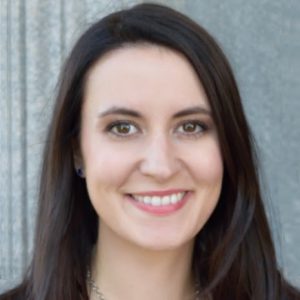(University of South Carolina) – It was Graduate Director for the General Master of Public Health Mike Byrdand Assistant Research Professor of Social Work Katherine Leith who ultimately recruited Shannon Palm to pursue the Master of Social Work/Master of Public Health dual degree. “They described an experience that aligned with my goals better than any other program,” says the May graduate.

Shannon Palm graduated in May with a Master of Social Work and Master of Public Health. Through her dual degree program, she has built expertise in human trafficking, child mortality prevention, injury prevention and public policy improvement.
That experience included extensive practical work that built on her three years of study in the complementary programs. “Public health and social work are closely intertwined, specifically in administration and policy,” says Palm, who focused her studies in Health Services Policy and Management (HSPM). “As a HSPM and Community, Social and Economic Development-trained dual degree graduate, I love investigating the etiology of an issue and being able to confront the social justice impact with evidence-based solutions. Both public health and social work have strong approaches to moving the needle for systemic policy analysis and institutional quality improvement.”
Public health and social work are closely intertwined, specifically in administration and policy.-Shannon Palm, MSW/MPH Graduate
Originally from Connecticut, Palm earned a bachelor’s degree in Art Therapy from Marywood University in Pennsylvania before spending a few years in Colorado as a milieu mental health counselor at the Aurora Mental Health Center and as a research assistant in the GEM Lab at the University of Denver. In 2014, she moved to South Carolina to begin her master’s programs at UofSC.
The majority of Palm’s research has focused on human trafficking, child mortality prevention, injury prevention and public policy improvement. On the social work side, she looks at the policy and prevention of human trafficking and the commercial sexual exploitation of children. Her public health interests examine injury and violence prevention, neurodevelopmental and related disabilities and impact assessment development.
In building her expertise in these areas, Palm has worked with the South Carolina Department of Health and Environmental Control, State Child Fatality Advisory Committee, Maternal and Child Health Bureau’s South Carolina Leadership Education in Neurodevelopmental and Related Disorder Training Program, and the Brain Injury Association of South Carolina. “These seem like vastly different issues but they all share commonality with resulting trauma,” Palm says.
She recently completed a practicum with Children’s Trust of South Carolina, where she played a critical role in getting their Racial Equity Impact Assessment tool off the ground. This type of assessment looks at how different racial and ethnic groups will be affected by a proposed policy regardless of context (e.g., health, education, community development) and addresses those impacts before a policy is implemented.
“Children’s Trust is the statewide leader in preventing child abuse, neglect, and unintentional injury, and we became interested in exploring this tool as a policy-level prevention strategy to mitigate racial and ethnic disparities of opportunity for children in South Carolina,” says Policy and Research Associate Whitney Tucker. “Unfortunately, when we presented information about the tool to external stakeholders, it was found to have little utility because there was so little information available on how to properly complete each step of the assessment and ensure that it was implemented with fidelity. Shannon decided to solve that problem.”
Shannon’s work will help our community partners to prevent disparities based on race and ethnicity. – Whitney Tucker, Policy and Research Associate for Children’s Trust of South Carolina
Palm researched the few similar models in use around the country. Then she wrote a step-by-step guide for completing a Racial Equity Impact Assessment for use by organizations, community members, and policymakers. She obtained preliminary data about perceived utility and acceptance of the guide from several stakeholder groups and used their feedback to improve it even further.“
The guide combats implicit bias and enables organizations at all capacity levels to effectively determine whether a policy they are considering is equitable to all potentially affected racial and ethnic groups,” says Tucker. “Shannon’s work will help our community partners to prevent disparities based on race and ethnicity.”
In recognition of her contributions toward this project, the HSPM department named Palm the 2017 recipient of the Michael D. Jarrett Award. Named for the former commissioner of the South Carolina Department of Health and Environmental Control, this honor is given to an MPH student who demonstrates exemplary academic performance and commitment to public health as well as a high potential for leadership. Her work not only advances the scientific knowledge in this area but is also under consideration by other states as a potential model for broader use.
“I plan to keep working on quality improvement on interdisciplinary teams professionally and in my volunteer work,” says Palm, whose long-term plan is to return to graduate school to earn a doctoral degree after she gains some more experience in the field.
To future students, Palm suggests learning about as many fellowships and scholarships as possible and to get to know faculty members. “They are your lifelines and are just wonderful people,” she says.
Two of those wonderful people for Palm during her MPH program were Kelli Kenison and Ronnie Horner. “Dr. Kenison has an amazing capacity to get to the root of an issue and empower you to work through it. She inspires me to push myself in the field and take calculated risks,” says Palm. “Dr. Horner has been the most kind and caring advisor throughout the navigation of my three-year dual degree. He has shown up for me when I really needed an advocate. I don’t know what I would have done without either of them.”
“All the HSPM and Arnold School faculty have been inspiring in their area of specialization,” she adds. “Sometimes it took me until a class was over to realize how powerful those course concepts and life lessons were.”



